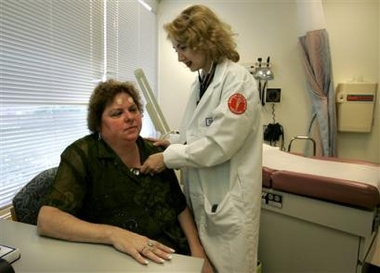Women who put on extra pounds raise their risk of getting frequent heartburn
or making symptoms worse, even if they aren't overweight, a new study found.

Suzanne Hagerty of
Salem, N.H. is examined by Dr. Caroline Apovian, director of the Center
for Nutrition and Weight Management at the Boston University Medical
Center in Boston, Wednesday, May 31, 2006. Women who put on extra pounds
raise their risk of getting frequent heartburn or making symptoms worse,
even if they aren't overweight, a new study found. Compared to women whose
weight didn't change, a moderate gain doubled the chances of heartburn and
acid reflux. Shedding the pounds cut the risk by about 40 percent,
according to the report in Thursday's New England Journal of Medicine.
Hagerty is wearing bandages from a previous doctor visit.
[AP] |
Compared to women whose weight didn't change, a moderate gain doubled the
chances of heartburn and acid reflux. Shedding the pounds cut the risk by about
40 percent, according to the report in Thursday's New England Journal of
Medicine.
"I see this as one more good reason to try to lose weight if you've put on a
few pounds," said the lead author of the study, Dr. Brian C. Jacobson of Boston
University Medical Center.
A good example is Suzanne Hagerty of Salem, N.H. Although still overweight,
Hagerty said dropping 25 pounds allowed her to stop taking the heartburn drug
Prilosec.
"Since I've lost the weight, I have no problems sleeping and I have no issues
with reflux," said the 45-year-old human resources manager.
Persistent heartburn is the result of stomach acid backing up into the
esophagus. It creates a burning pain in the chest or a bitter taste in the
throat or mouth.
Hagerty's doctor at Boston University Medical Center said heartburn medicine
is usually the first to go when patients drop weight and their symptoms ease.
"It's as little as 10 pounds. It's amazing," said Dr. Caroline Apovian,
director of the Center for Nutrition and Weight Management.
The research published Thursday used data from the long-running Nurses'
Health Study. Previous research that showed a connection between weight and
heartburn focused on the overweight and obese. Jacobson and his colleagues also
looked at normal-weight women and studied how weight change over 14 years
affected symptoms.
About 1 in 5 of the 10,545 nurses who filled out questionnaires said they had
heartburn at least once a week, with about 60 percent describing symptoms as
moderate to severe. Their body-mass index was calculated from earlier reports on
their height and weight.
The researchers concluded there was a strong link between weight and frequent
heartburn, with the risk rising along with body-mass index in both normal-weight
and overweight women.
For example, a 5-foot-6 woman who weighs 125 pounds and one who weighs 140
pounds are both in the normal-weight range. The slimmer woman has a BMI of about
20, while the heavier woman's is over 22.
Based on their findings, Jacobson said, the 140-pound woman would be about 40
percent more likely to have heartburn symptoms than the 125-pound woman.
Overweight or obese women would be two to three times as likely to have frequent
heartburn.
Jacobson said he plans to study whether the same holds true in men.
In the nurses' study, the researchers found the link remained about the same
when they took into account other factors that contribute to heartburn, such as
smoking, drinking, diet and diabetes.
"It's one of the stronger pieces of data that support what many of us have
believed but had difficulty proving," said Dr. Kenneth DeVault, of the Mayo
Clinic in Jacksonville, Fla., who was not involved in the study.
Treatment for frequent heartburn includes antacids, over-the-counter and
prescription drugs, diet changes and eating smaller meals. Serious but uncommon
complications include a narrowing of the esophagus and changes to the lining
which can be precancerous.